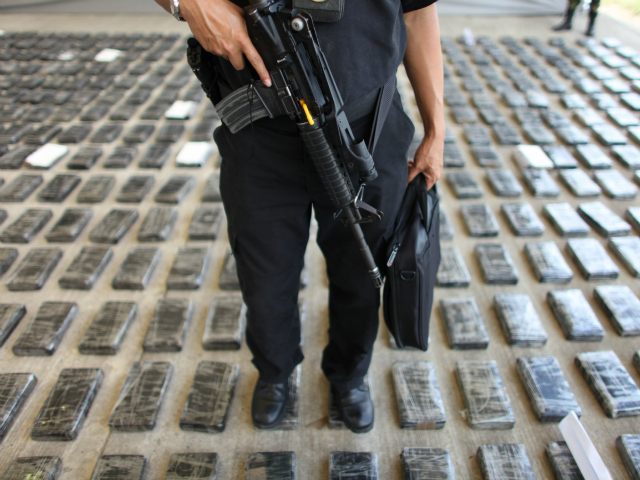The Colombian government’s attempt to legitimize the FARC terrorist organization has resulted in the emboldening of the world’s wealthiest non-jihadist terror group, details the Wall Street Journal‘s Mary Anastasia O’Grady.
“No member of the North Atlantic Treaty Organization has suggested that it ought to hand social, economic and political power to ISIS in exchange for an end to hostilities,” O’Grady writes, “…[yet] when it comes to indiscriminate murder, Islamic State has nothing on the Revolutionary Armed Forces of Colombia (FARC).”
O’Grady—a longtime observer of Latin American politics who has analyzed severe human rights violations by leftist governments and organizations in the region—notes that the Colombian government’s decision to engage the FARC in “peace talks” would be the equivalent of doing the above with the Islamic State.
Colombian President Juan Manuel Santos announced a peace deal in September with the terror group, which has been in existence for more than 50 years and is accused of killing as many as 200,000 Colombians during that time. The deal would require all FARC guerrillas to hand over their weapons to the government and submit to a tribunal tasked with determining their punishment. Those found guilty of “political crimes”—as opposed to “crimes against humanity”—will not have to serve time in prison. Many fear that crimes such as drug trafficking and political assassinations will be deemed “political crimes” unworthy of imprisonment.
In addition to the proposed soft punishments for those who hand their weapons over, Santos has promised not to extradite FARC terrorists accused of crimes internationally. This week, he denied the United States a request to extradite a terrorist known as “Misael,” accused of running a drug trafficking scheme that significantly hurt American interests. Fearing extradition under Santos’s predecessor, now-Senator Álvaro Uribe, most of the FARC’s leadership currently lives in Havana, where it is granted safe haven.
O’Grady argues that the bigger problem with much of the concessions package, which would also include a transition process to turn the FARC from a terrorist group to a political party, is that it has emboldened the FARC to ask for more. “Its leaders say they will never serve any jail time, will not surrender their weapons, will not hand over the illicit wealth they have acquired by drug-trafficking, kidnapping and extortion, and will not compensate its victims,” she writes. “Mr. Santos has agreed to all these terms, and says that FARC drug-trafficking is a political crime that can be pardoned.”
The Colombian government has rejected at least one proposal by the terror group: a project to divide the nation into “peace zones” where the FARC would be more freely allowed to operate.
Following the announcement of an agreement in September, the FARC almost immediately threatened to walk back the peace deal in October, indicating their leadership is seeking even more concessions than those Santos has already agreed to.
To get a sense for the sort of “political crimes” that may be pardoned, she recounts an especially harrowing rural massacre, reminiscent of the tactics used today by Islamic State satellite group Boko Haram:
Some 100 locals—residents of the village and others from neighboring farms and ranches—had gathered to welcome the New Year. Around 10:30 p.m., 30 FARC rebels on horseback rode into town and began unloading their clips. According to press reports, in 10 minutes eight women, five men and four children, including a two-year old girl, were slaughtered.
While significantly deteriorated during Uribe’s tenure—largely due to counterterrorism operations designed by the CIA under President George W. Bush—the FARC has regained strength through drug trafficking. As of November 2014, it is the wealthiest non-jihadist terror group in the world. Only the Islamic State and Hamas generate more money. As the FARC has neither access to crude oil nor ancient artifacts, as ISIS does, it must rely on the drug market.
Colombians will have to vote for the peace deal in order for it to be approved by the government. Polls show the nation is not particularly enthusiastic about aiding the group. According to a poll in Colombian newspaper El Tiempo, 60 percent of Colombians believe the FARC does not have any real intention of abandoning violence. 64.8 percent doubt the peace deal will be implemented by the agreed-to deadline in March. Colombians are also extremely apprehensive about the return of FARC guerrilla fighters to civilian communities, another poll found in October.
A Congressional vote to decide the date of the referendum has been postponed Wednesday, as many members of the legislature failed to appear, in a sign of protest. Centro Democrático, Uribe’s party, has begun a campaign against the vote itself, with the title “El Plebiscito es una FARCsa” (“The Plebiscite is a FARCe”):
Whether the FARC will be allowed to enter the Colombian political fray as a bona fide party, and what they will do with that power if they achieve it, remains to be seen. Growing opposition to the legitimization of the FARC has not appeared to deter the federal government, however, inspiring fear in many who have been unable to forget the group’s atrocities.

COMMENTS
Please let us know if you're having issues with commenting.